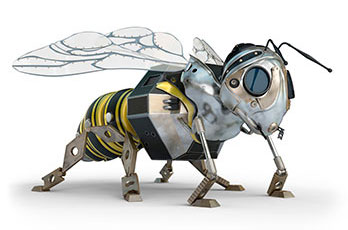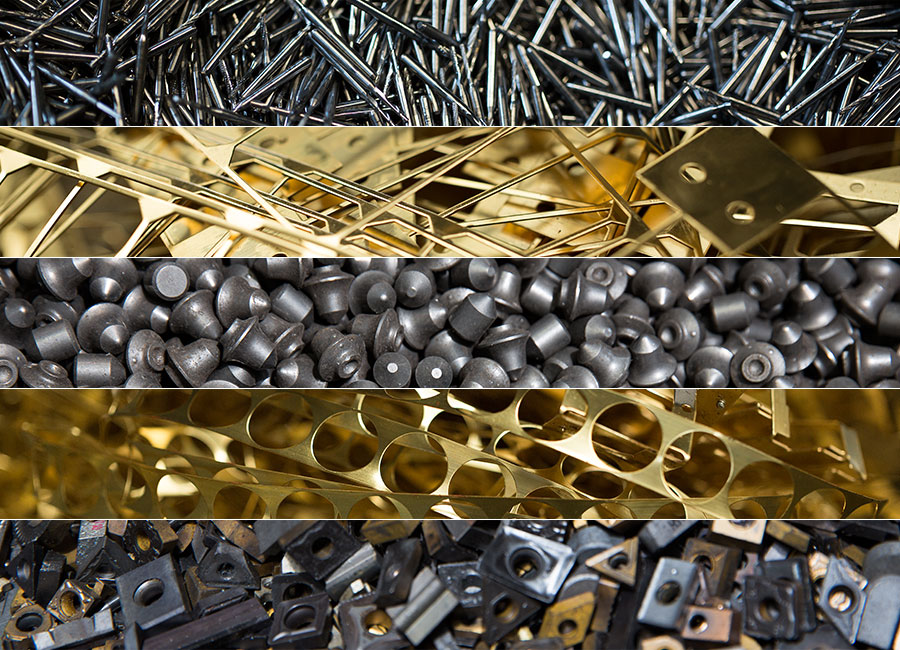
WE SWARM OUT ON YOUR BEHALF!
AS YOUR PARTNER IN THE BUYING AND SELLING OF SECONDARY RAW MATERIALS, WE PROVIDE YOU WITH A COMPLETE SERVICE REGARDING ALL ASPECTS OF METALS AND THEIR ALLOYS.
Simply contact us and we'll come up with a solution tailored specifically to you – quickly and reliably.

Call:
Click and phone

Service telephone:
+49(0) 8245 96799-0

Call-back
We'll call you back
Call-Back-Service

BELOW IS A SUMMARY OF OUR RANGE OF BUYING AND SELLING SERVICES.
We trade in the metals mentioned in the form of pieces, sheet, swarf, dust and sludge. If you want to sell or buy any other type of material, we will be happy to provide you an individual quotation.
- TUNGSTEN CARBIDE/TUNGSTEN ALLOYS
Tungsten carbide, formerly also referred to colloquially as Widia (as hard as diamond), is a material that is produced via a sintering process and that consists of very hard tungsten carbide (often tungsten carbide + cobalt, which are bonded together in a metallic matrix).

We trade in the following scrap materials:
Tungsten carbide thread-milling cutters
Screw taps
Tungsten carbide processing
Tungsten carbide drill bits
Tungsten carbide turning tools
Tungsten carbide milling tools
Sintered carbide
Tungsten carbide planer knives
Tungsten carbide wood cutters
Tungsten carbide circular saw blades
Tungsten carbide balls
Tungsten carbide dies
Tungsten carbide precision parts
Tungsten carbide precision tools
Tungsten carbide moulding knives
Tungsten carbide powder
Tungsten carbide blanks
Tungsten carbide sludge
Tungsten carbide cutting tools
Tungsten carbide special tools
Tungsten carbide punching tools
Tungsten carbide dust
Tungsten carbide engraving tools
Tungsten carbide wear protection
Tungsten carbide wear parts
Tungsten carbide tools
Tungsten Carbide turnings
Tungsten carbide centring tips
Tungsten carbide draw plates
Tungsten carbide drills
Tungsten carbide milling tools
Tungsten carbide powder
Tungsten carbide sludge
Tungsten carbide scrap
Tungsten carbide swarf
Tungsten carbide rods
Hevimet
Cold-impact dies
Mirco-drills
PCD tools
Circuit board drill
Green parts
Press tools
Printed circuit board drill
Reamers
Raw tungsten carbide
Rotary milling tools
Heavy metal
Countersinks
Street scrapers
Forming tools
Solid tungsten carbide
Solid tungsten carbide drill bits
Rolling rings
WCu
indexible inserts
Cutting inserts
Morgan Rolls
Widia scrap
WNi
WNiCu
WNiFe
wire electrode cutting material Tungsten
Copper-tungsten
Nickel-tungsten
residuesMachining tools
Waste
Mining
Drilling tools
Bushings
Densalloy
Diamond tools
Rotary tools
Moulded parts
Burrs
Glass-cutting wheels
Paper-cutting knives
Tungsten carbide recycling
Tungsten carbide scrap
Construction parts
Non-sintered carbide
Tungsten carbides
Swarf
Solid tungsten carbide scrap
Solid tungsten carbide tools - NICKEL ALLOYS
Nickel-based and super alloys are very resistant to heat and corrosion, properties that can be achieved above all through complex alloying additions. Due to these characteristics, these materials are primarily used in power train, aviation and aerospace technology.

We trade in the following scrap materials:
Alloy 49
Alloy 59
Alloy 713C
Alloy 713LC
CMSX-10
CMSX-11B
CMSX-11C
CMSX-2
CMSX-4
CMSX-6
CUSTOM 450
CUSTOM 455
Hast X
Hastelloy S
Haynes 120
Haynes 150
Haynes 160
Haynes 188
Haynes 214
Haynes 230
Haynes 242
Haynes 25 - L 605
Haynes 282
Haynes 556
In 100
In 600
In 601
In 617
In 6201
In 6203
In 625
In 738
In 792
In 939
INCOLOY alloy 020
INCOLOY alloy 028
INCOLOY alloy 25-6MO
INCOLOY alloy 27-7MO
INCOLOY alloy 330
INCOLOY alloy 330HC
INCOLOY alloy 800
INCOLOY alloy 800HINCOLOY alloy 800HT
INCOLOY alloy 801
INCOLOY alloy 802
INCOLOY alloy 803
INCOLOY alloy 805
INCOLOY alloy 825
INCOLOY alloy 832
INCOLOY alloy 840
INCOLOY alloy 864
INCOLOY alloy 890
INCOLOY alloy 901
INCOLOY alloy 903
INCOLOY alloy 904
INCOLOY alloy 907
INCOLOY alloy 908
INCOLOY alloy 909
INCOLOY alloy 925
INCOLOY alloy A-286
INCOLOY alloy DS
INCOLOY alloy MA956
INCOLOY alloy MA957
Inconel 182
Inconel 62
Inconel 657
Inconel 718
Inconel 800H
Inconel 800HT
Inconel 82
Inconel alloy 050
Inconel alloy 22
Inconel alloy 230
Inconel alloy 600 & 600T
Inconel alloy 600SP
Inconel alloy 601
Inconel alloy 601GC
Inconel alloy 603XL
Inconel alloy 604
Inconel alloy 606
Inconel alloy 613
Inconel alloy 617
Inconel alloy 622
Inconel alloy 625Inconel alloy 625LCF
Inconel alloy 671
Inconel alloy 672
Inconel alloy 686
Inconel alloy 690 & 690HT
Inconel alloy 691
Inconel alloy 693
Inconel alloy 702
Inconel alloy 706
Inconel alloy 718
Inconel alloy 718SPF
Inconel alloy 721
Inconel alloy 722
Inconel alloy 725
Inconel alloy 725HS
Inconel alloy 740
Inconel alloy 751
Inconel alloy 783
Inconel alloy C-276
Inconel alloy G
Inconel alloy G-3
Inconel alloy HX
Inconel alloy MA6000
Inconel alloy MA754
Inconel alloy MA758
Inconel alloy X-750
Inconel MA 6000
Kovar
Mar-M-200+Hf
Mar-M-247
Mar-M-247 DS
Mar-M-421
Mar-M-509 / ECY 768
Mar-M-918
MERL76
N 155
Nickel waste, scrap and swarf
Nimonic 101
Nimonic 105
Nimonic 108
Nimonic 115
Nimonic 263Nimonic 70
Nimonic 75
Nimonic 80A
Nimonic 81
Nimonic 90
Nimonic 91
Nimonic alloy PE11
Nimonic alloy PE16
Nimonic alloy PK31
Nimonic alloy PK33
Nimonic alloy PK37
PH13-8Mo
PH15-7Mo
Preci222
PWA 1480
PWA 1483
PWA 1484
RA 330
RA 333
Reinnickel
René 41
René 7
René 80
René 80 H
Rene 95
René N4
René N5
René N6
RR 2000
SC 180
SRR 99
U 500
U 520
U 700
U 710
U 720
Udimet
Waspaloy
X 750
X40
X45 - COBALT ALLOYS
Cobalt alloys, some of which are also called super alloys, are very resistant to heat and corrosion, properties achieved mainly by means including complex alloy additions. Due to these characteristics, these materials are primarily used in power train, aviation, aerospace and medical technology.

We trade in the following scrap materials:
Stellite 1
Stellite 100
Stellite 12
Stellite 151
Stellite 188
Stellite 19
Stellite 20
Stellite 21
Stellite 23Stellite 25
Stellite 3
Stellite 30
Stellite 31
Stellite 4
Stellite 6
Stellite 7
Stellite 8
Stellite F75Stellite X40
Stellite X45
Tribaloy
Umco 50
Umco 51
Waste
Sheet metal
ElgiloyCast parts
Hiperco 35
Hiperco 50
Maragin
Permendur 2V
Scrap
Swarf
Dust - TITANIUM ALLOYS
Due to its properties of extreme hardness and resistance to wear and corrosion while at the same time being very light, titanium is primarily used in power train, aviation, aerospace and medical technology, as well as in the chemical industry.

We trade in the following scrap materials:
Titanium 3.7025
Titanium 3.7035
Titanium 3.7165
Titanium 3.7194
Titan 3.7235
Titan 6/4Titanium 90/6/4
Titanium Grade 1
Titanium Grade 2
Titanium Grade 3
Titanium Grade 4
Titanium Grade 5Titanium Grade 6
Titanium Grade 7
Titanium Grade 9
Waste
Sheet metal
Cast partsPure titanium turnings
Scrap
Swarf
Dust - FERRO ALLOYS
Ferro alloys are used in the steel industry to produce a variety of different alloys.

We trade primarily in the following scrap materials:
Ferro chromium
Ferro manganese
Ferro molybdenum
Ferro niobium
Ferro vanadiumFerro tungsten
Ferrochromium
Ferromanganese
Ferromolybdenum
FerroniobiumFerrovanadium
Ferrotungsten
FeV
FeW
FeCrFeMn
FeMo
FeNb - PURE METALS AND THEIR ALLOYS
The pure metals that we trade, are specially sorted and prepared for later utilisation. The level of purity, which is continually checked in our laboratory and the experience of our staff guarantees a stable quality.

We trade primarily in the following scrap materials:
Chromium waste
Chromium scrap
Chromium targets
Cobalt
Cobalt waste
Cobalt scrap
Cobalt swarf
Molybdenum
Molybdenum waste
Sheet molybdenum
Molybdenum wire
Molybdenum scrapMolybdenum swarf
Molybdenum targets
Molybdenum coils
Nickel
Nickel waste
Sheet nickel
Nickel wire
Nickel scrap
Nickel dust
Nickel targets
Niobium
Niobium wasteSheet niobium
Niobium scrap
Pure chromium
Pure cobalt
Pure molybdenum
Pure nickel
Pure niobium
Pure titanium
Pure tungsten
Titanium
Titanium waste
Titanium cast partsTitanium swarf
Titanium heat-exchanger panels
Tungsten
Tungsten waste
Sheet tungsten
Tungsten wire
Tungsten scrap
Tungsten swarf
Tungsten targets
Tungsten coils - STAINLESS STEEL
Stainless steel is a name for alloyed and non-alloyed steels with a special degree of purity.
We trade in numerous grades and forms of stainless steel scrap, e.g. in alloyed scrap that contains nickel, chromium or molybdenum as significant alloy elements.
We thus put scrap from production processes, as well as old scrap, back into the raw material cycle.
We trade in the following scrap materials:
AISI 430
Alloy 20
Alloy 59
Chromium/nickel/molybdenum waste
Chromium/nickel/molybdenum swarf
Chromium/nickel waste
Chromium/nickel swarf
Chromium steel scrapChromium steel swarf
CMSX6
Colmonoy 6
Haynes 230
Haynes 242
Haynes 59
Hy-Mu-77
Hy-Mu-80Incoloy 800
Inconel 904
Mu-metal
Nimonic 901
Nitronic 33V2A-waste
V2A-swarf
V4A-waste
V4A-swarf
etc.Plus waste and swarf with the following material numbers:
1.3964
1.4310
1.4313
1.4333
1.4333
1.4333
1.4361
1.4410
1.4435
1.4441
1.4460
1.4462
1.44661.4507
1.4521
1.4529
1.4534
1.4539
1.4542
1.4542
1.4545
1.4547
1.4828
1.4841
1.4849
1.48521.4855
1.4859
1.4864
1.4876
1.4876
1.4922
1.4980
1.4988
1.4988
1.6580
1.6982
2.4633
2.46582.4660
2.4662
2.4663
2.4669
2.4815
2.4867
2.4869
2.4879
2.4969
2.4975
etc. - NON-FERROUS
Non-ferrous metal is the name used to describe all metals other than iron and metal alloys in which iron is not contained as a main element. Examples of this are copper, aluminium, zinc, tin, bronze and brass. Sometimes the abbreviation 'NF metal' is used for such metals. Due to their often striking colour, they are also known in Germany as 'Buntmetalle' (colourful metals). However, what are known as 'white metals' are categorised as non-ferrous metals as well.

We trade in the following scrap materials:
Aluminium Al:
Aluminium,
Copper,
Brass,
Bronze,
Zinc,
Tin,
Lead in the shape of sheets,
wire,
turnings,
swarfs,
blocks,
residues,
cathodes,
targets,
mates,
alloys,
plates,
tubes,
punchings,
strips,
etc. - HSS / Tool steel
HSS: High speed steel, abbreviated as HSS, is the name given to special alloys with exceptional hardness and resistance to wear. The main alloy elements are tungsten, molybdenum, vanadium, cobalt and chromium. The metal used as the basis for HSS is iron. HSS is also produced by powder metallurgy (so-called PM steel), then having extremely fine carbide distribution. HSS steels are predominantly used for the following products: drill bits, milling tools, turning tools, taps, rollers, rolling rings, countersinks, frictional tools, forming tools, cutting tools and punching tools.
Tool steel: Tool steel is the name given to steel that is used for making tools and moulds. Based on their composition, a distinction is made between non-alloyed and alloyed tool steels. Non-alloyed tool steels cannot be fully hardened (high critical cooling rate) and are also not suitable for high operating temperatures. Non-alloyed tool steels therefore are categorized as cold work steel. Alloyed tool steels are used in tools subject to greater stress and can generally be fully hardened. Also, depending on the alloy elements present, they do not warp as much during hardening. The alloy elements are often chromium, vanadium, manganese, molybdenum, nickel, tungsten and cobalt. Tool steels are predominantly used for the following products: dies, stamps, punching technology tools, woodworking tools, thread rollers, crimping tools, measuring tools, clamping tools, piercing dies, paper and cellulose industry machine cutters, embossing tools, screw conveyors, etc. A distinction is made between cold work steel (operating temperature up to 200°C), warm work steel (operating temperature up to 400°C) and high speed steel (operating temperature up to 600°C).

We trade primarily in the following scrap materials:
HSS:
AISI M1
AISI M2
AISI M3
AISI M4
AISI M7
AISI M10
AISI M15
AISI M30
AISI M33
AISI M35
AISI M36
AISI M41
AISI M42
AISI M50
AISI M52AISI T1
AISI T4
AISI T5
AISI T6
AISI T7
AISI T8
AISI T15
AISI T21
AISI T42
etc.Tool steel:
AISI A2
AISI D2
AISI D3
AISI H10
AISI H11
AISI H12
AISI H13
AISI H19
AISI H21
Nihavel 1CPM 3V
CPM 9V
CPM 10V
CPM 15V
etc.
The trademarks, registered trademarks, logos, trade names and brand names used on this site are not owned by Stadler Metalle e.K. It may not be concluded from our use of these names and marks - even if they are not specifically identified as such - that they are free to use; all rights rest with their owners, whom we acknowledge. The information on this site is the result of a rigorous, extensive study of many sources. While the utmost care has been taken to ensure accuracy, Stadler Metalle e.K. cannot accept responsibility for any errors or omissions that may have arisen in the course of this research. The various trade names are used only for reference purposes utilised in putting together this information.

